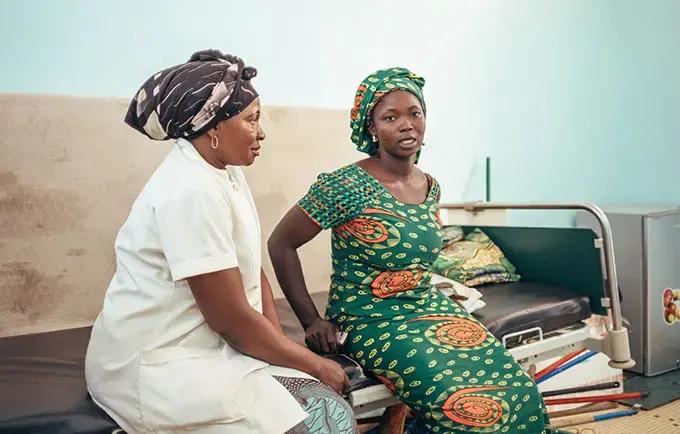Bamako, Mali. Since December 2014, the ritual in Bamako-Senou International Airport is the same. All passengers departing and arriving are subject to temperature screening accompanied by awareness actions through staff hired by UNFPA, the United Nations Population Fund, as part of the fight against the Ebola virus disease in Mali.
These 20 "Ebola health workers" are midwives, health technicians and nurses. They control people’s temperature and are at the disposal of the airport, recognizable by their caps and polo shirts on which messages of awareness about Ebola are printed.
They participate actively in the fight against Ebola in Mali where the first case was recorded in October 2014 with a young girl coming from Guinea, who died in the region of Kayes region, in the western part of Mali.
In November 2014, while contact tracing of the young patient was completed and discovered no further cases linked to her, a second case was registered with the arrival of a man, also from Guinea, carrying the deadly virus in Bamako. He has contaminated directly or indirectly seven people, five of whom have died and two of whom have been healed.
In order to prevent new cases, UNFPA is actively participating in the fight Ebola in Mali. Bamako, the Malian capital is served by several international airlines and it was important not to isolate the country. Last December, Bamako-Senou Airport has seen a lot of movement with an average of 620 passengers passing through each day. Official statistics also reveal that in 2014, the airport recorded more than 602,000 passengers, who passed through Bamako.
A steady pace
Every day, two teams, each comprising of five health agents, take turns in Senou. From 8:00 AM to 6:00 PM it is the first team; then from 6:00 PM to 8:00 AM the next day the second team takes over. The day shift begins with a briefing from the team of the night shift and vice versa for the next shift.

ON 6 January 2015, Ms. Fanta Coulibaly who coordinates the day team, dispatched her colleagues as follows: two agents are assigned to departing passengers, one in the VIP lounge, another at the boarding gate and one colleague goes to the arrival gate. This repartition may vary depending on the number of passengers as it was the case that day, with the arrival of several flights. The Ebola health team adapts to the flow of passengers departing and arriving.
Ms. Coulibaly says her team is working with the agents of the referral health centers of the six communes of Bamako called CSREF. Thus, when a "Ebola health worker" is absent, he is immediately replaced by a counterpart from a CSREF.
When departing, all passengers are subject to a temperature screening before reaching the baggage check room. A second temperature screening is performed in the boarding area. The temperature recorded is then written on the boarding pass, which is then sealed. No passenger has access to the plane if his temperature and the 'health check' stamp do not appear on the boarding pass. On arrival, passengers are also subject to temperature controls.
In three weeks of presence at the airport - from 15 December 2014 to 6 January 2015-, the health team found no cases of Ebola virus disease. Two people who experienced high temperatures -between 38 and 40 degrees- were under observation. The tests concluded that they suffered from a cold and malaria.
But, sometimes passengers refuse to undergo checks because they are feeling fine.
"We take them aside and talk to them. Following this conversation, they are more cooperative," says Ms. Coulibaly, who is very proud of her mission.
Although the work is going well, the health workers who have been recruited for three months, want passengers traveling through Bamako-Senou to be informed of the new provisions of temperature control in advance, which is as essential as checking in one’s baggage.
The situation of the fight against Ebola virus disease provided by the Malian authorities on 12 January 2015 stated that "since 16 December 2014, there has been no cases of Ebola. We have seen seven confirmed cases, five of which have resulted in deaths and two have been cured."
In Mali, UNFPA is a member of the Communication Technical Group on Ebola under the lead of the World Health Organization (WHO). The Fund prints and distributes communication materials on Ebola. Posters with awareness messages are visible throughout Bamako.



